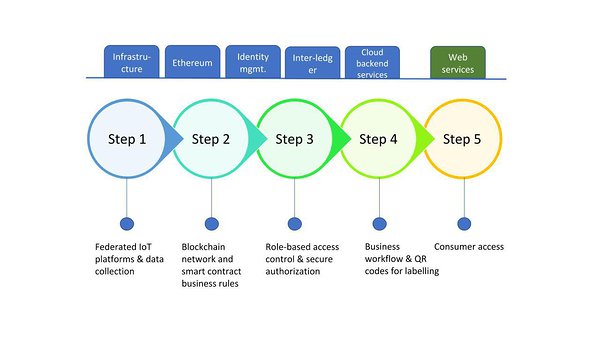“Field-to-fork”: empowering the transparency of food chain supply
Inefficiency in the food supply chain is a major challenge problem worldwide. With so many different organisations and business segments transacting with each other, there are many risks affecting the efficiency and quality of goods transfer from field to market, thus impacting business trust, profit and consumers retain.
That is why more and more producers’ associations, distributors and large retailers in the food industry are deploying new technologies, such as blockchain and IoT, to advance their inventory management systems, distribution processes and trade. At the same time, trends show that consumer organisations want to know more about food’s origin and growing conditions apart from just nutritients.
A digital food supply chain powered by blockchain and IoT can enable full transparency among suppliers, retailers and consumers, enhancing confidence and trust in purchased and consumed goods and services.
On one hand, IoT is a cornerstone of monitoring production and in-transit shipment conditions and collecting all the necessary data for traceability applications. On the other hand, the unique characteristics of blockchain technology make it especially suitable to create a verifiable chain of custody upon immutable digital signatures which encode goods’ conditions and transactions as their responsibility passes from one business segment in the supply chain to another. Armed with reliable data and a complete chain of custody, companies can track full product provenance, develop more accurate supply and demand forecasting models, restructure contracts and verify compilation to food and environmental regulations. Moreover, customers can be assured of the information they receive to localized goods given that no entity or group of entities can arbitrarily change the information contained within the blockchain.
SOFIE introduces an open and neutral products traceability platform underpinned by blockchain technology that enables true information sharing and collaboration across farming, transportation, warehouse and market retailers, thereby increasing industry innovation and promoting secure and safe transfer of goods to the market.
The design and used technology, shown in the figure (see below), are validated in a pilot case study focusing on how table grapes are transferred from the field to the market point.
Key enablers of the SOFIE traceability proposition are:
- The usage of standardized semantics to enable cross platform interoperability upon heterogeneous closed and open IoT verticals which are operated by the various organisations and segments participating in the supply chain.
- A smart contract-based business model that governs all interactions between organisations and implements trade and assets management rules in executable code in a secure and privacy preserving way.
- The secure and atomic transfer and exchange of digital assets between different blockchains which are used to generate operational and business benefits per case.
The SOFIE traceability solution aims to offer two main services to consumers and stakeholders:
1) a QR code based traceability service for final consumers to overview the full history of products from the field to the supermarket shelf by using their mobile devices, and
2) a trusted and fast product audit service for companies to identify, trace back and verify causes of product safety and quality issues.
Currently, alpha testing phases of SOFIE food supply chain platform are under completion. Stay tuned for more information and updates!
